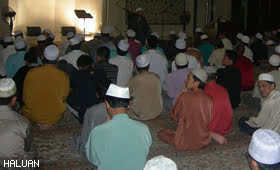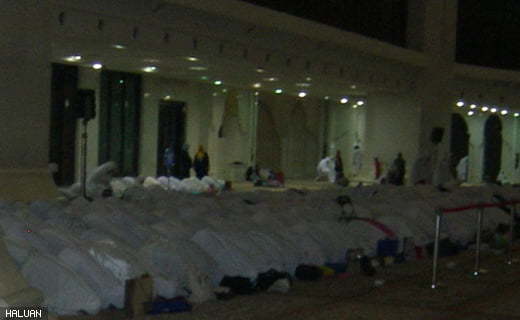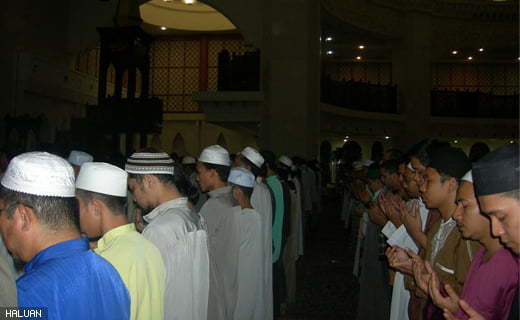
With Huffaz Ramadan : Arabian Touch at Malaysian Tarawih
[Al-Jazeera] The tarawih prayer is an integral part of rituals in the nights of Ramadhan.
Amongst the major considerations are the choice of imams and bilals to lead the ibadah in masjids all over the country especially when many of them are hosts to imams specially brought from foreign countries such as Saudi Arabia, Syria, Egypt and others. They are positioned as guest imams in masjids in the cities as well as in states throughout the country.
Various efforts are undertaken to invite these imams as part of a strategy to encourage more Muslims to attend prayers at the masjids by performing prayers and attending lectures, as executed by the Organisation of Graduates of Educational Institutions, Malaysia (HALUAN) with its project, “Ramadhan With Huffaz Palestin, Syria and Somalia”.
While receiving and welcoming the huffaz entourage recently, project coordinator Dr Syed Muhammad Haleem said, “we want you to be together with us in our country to call people to Allah. Malaysians are waiting to hear your melodious recitation while leading tarawih. And they are also anxious to hear from you concerning the atrocities that are inflicted upon your people in Palestin, Syria and also in Somalia”.
Tasbih and supplication
In most masjids, the huffaz conduct 20 rakaats of tarawih interspersed with the recitations of tasbih and supplications along with salutations to the beloved Prophet Muhammad SAW. The ending is awaited by the congregation whereby a long supplication is being read rather melancholically by the invited huffaz.
The excitement over the invited huffaz is further buoyed by the popular reality TV programme called “Young Imam”, which inspires the youths to frequent the masjids this Ramadhan.
Frequently voices of the elderly imams in masjids across Malaysia give way during Ramadhan to younger imams who can cleverly mimic the sounds of popular imams from Masjidil Haram and Masjidil Nabawi. They also recite in the distinctive manner of popular reciters such as Sheikh Basset and Minshawi as well as other famous reciters. This episode is further enlightened by a particular imam huffaz who is good at mimicking many famous qaris from all over the world which then entertained the congregation of these masjids. His arrival is anticipated, and often preannounced a day earlier.
On the night of 17th Ramadan, Malaysia celebrates the Nuzul Quran with much fanfare nationwide involving even the King and her Prime Minister. It is also a public holiday in most states in Malaysia and celebrated as part of the last 10 days of the month of Ramadan.
Inside the masjids can be seen many men in congregation at the front while women make up the back rows while children under the ages of five are supervised in special rooms at the back so that they do not disrupt their parents who are deeply in servitude.
Before tarawih begins, the announcer informs the congregation the name of the imam and his nationality, reminds the activities that are going to take place at the particular masjid, about iftar, of good manners while in the masjid and the likes.
Community Masjids
In Malaysia, the government allows certain communities such as Arabs and Indians to construct their own masjids for their people and to practice the faith based on their traditions and sects.
For instance a masjid that is managed by the Indian Muslim community where tarawih is divided into three parts. The entire 30 juzuks of the Quran are divided between several imams each taking turns to lead the prayer.
Towards the end, recitation for the last 10 juzuks would be performed on the 20 rakaats, on an average of two rakaats per juzuk in order the finish reciting the entire Quran. Nevertheless, sometimes the recitations are too fast and difficult to comprehend.
In certain masjids, the electronic board displays a long list of names of people who have deceased so that the imam would recite special prayers for them.
There are quite a number of Arab youths who live in residential areas, mostly students of universities. There are amongst them those who have good recitation ability who could lead the prayers. Quite a number practice iktikaf by living inside the masjid during the entire last 10 days of Ramadan.
Original text by Mahmoud Al-Adam, Al Jazeera – Kuala Lumpur, can be found here.

Women in congregation doing tarawih in Malaysia.

Malaysia uses imams from Arabic countries.


